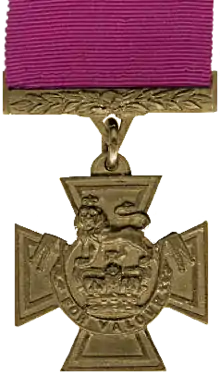Bernard McQuirt
Bernard McQuirt VC (1829 – 5 October 1888) was a British soldier born in Donaghcloney, County Down and was a recipient of the Victoria Cross, the highest and most prestigious award for gallantry in the face of the enemy that can be awarded to British and Commonwealth forces.
Bernard McQuirt | |
|---|---|
 | |
| Born | 1829 Donaghcloney, County Armagh |
| Died | 5 October 1888 (aged 58–59) Belfast, Ireland |
| Buried | |
| Allegiance | |
| Service/ | |
| Rank | Private |
| Unit | 95th Regiment of Foot |
| Battles/wars | Indian Mutiny |
| Awards | Victoria Cross |
Details
He was about 29 years old, and a private in the 95th (Derbyshire) Regiment of Foot (later The Sherwood Foresters (The Nottinghamshire and Derbyshire Regiment) ), British Army during the Indian Mutiny when the following deed took place on 6 January 1858 at the capture of the town of Rowa, India for which he was awarded the VC:
For gallant conduct on the 6th of January 1858, at the capture of the entrenched town of Rowa, when he was severely and dangerously wounded in a hand to hand fight with three men, of whom he killed one and wounded another. He received five sabre cuts and a musket shot in this service.[1]
Burial
McQuirt's memorial stone was erected in 1995 in an Anglican graveyard in Donaghcloney, where McQuirt was born. But his remains are not in this graveyard. McQuirt died in Erney Street off the Shankill Road, Belfast, 5 October 1888, and no one knew where he was buried. In 1993, an employee of Belfast City Council, Robert Burns, found McQuirt's registration and burial site in a Catholic plot of the Belfast City Cemetery. As there was no gravestone Burns contacted the Sherwood Foresters Museum in England and they proposed to pay for a stone. When Burns asked for permission to erect the stone in the graveyard the Catholic Church refused permission, claiming the plot was a poor plot with many other remains in the grave.
Bernard lived in obscurity at 72 Urney Street.[2] Robert then approached the City Council for permission to erect the memorial stone on a wall in Urney Street (off Shankill Road) were Bernard McQuirt VC died in 1888. This was also rejected. Then Robert approached locals from Donaghcloney to erect the memorial stone in the local village square beside the World War I and World War II war memorial. This was also rejected. Finally a local Church of Ireland Minister offered Burns access to the local Donaghcloney Church graveyard to erect the memorial stone.
In 2000 a British Army colour party from a regiment based in Northern Ireland finally dedicated the stone in memory of Bernard McQuirt VC. The inscription on the stone states:
Sacred to the memory of Private Bernard McQuirt VC 95th The Derbyshire Regiment who won the regiment's first VC at ROWA CENTRAL INDIA 6th January 1858 he died 5 October 1888 "NINETY – FIVE"[3]
References
- "No. 22324". The London Gazette. 19 June 1860. p. 4034.
- "Bernard McQuirt VC – victoriacross". vconline.org.uk. Retrieved 4 February 2018.
- "Irish Winners of the VC 1846 to 1945" is recorded in the photographic section between pages 128 & 129.
Listed in order of publication year
- The Register of the Victoria Cross (1981, 1988 and 1997)
- Clarke, Brian D. H. (1986). "A register of awards to Irish-born officers and men". The Irish Sword. XVI (64): 185–287.
- Ireland's VCs ISBN 1-899243-00-3 (Dept of Economic Development, 1995)
- Monuments to Courage (David Harvey, 1999)
- Irish Winners of the Victoria Cross (Richard Doherty & David Truesdale, 2000)
External links
- Location of grave and VC medal (Belfast, Northern Ireland)